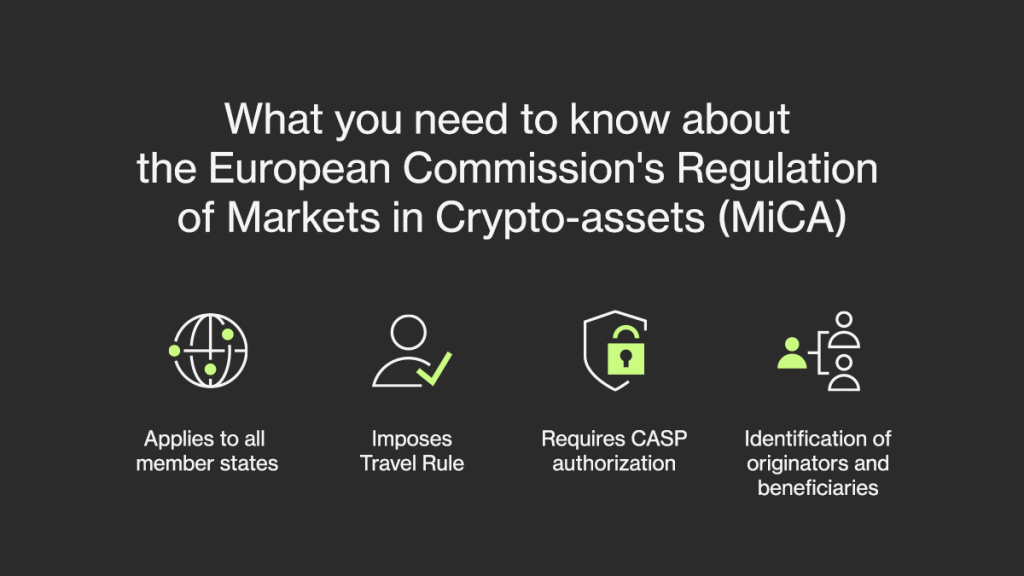Europe is known for its booming crypto market. However, the lack of a single framework for cryptocurrency regulations has posed uncertainty among providers. Currently, every country on the continent, including EU member states, has different stances on digital assets. Some are showing a positive and supporting attitude. Others try to impose strict taxation laws.
However, it’s all about to change in the coming years, at least in the European Union zone. The European Parliament has taken major steps to regulate the crypto market with a bill that aims to harmonize the regulatory framework among its members.
The framework will make it easier for crypto asset providers to understand and follow the regulatory regime while operating in Europe. But for now, let’s take a look at how European countries are regulating crypto.
Cryptocurrency Regulations in European Union

At the end of June 2022, the European Parliament and Council reached a provisional agreement on a new bill to regulate crypto-asset service providers (CASPs) in the region. The new framework is called the European Commission’s Regulation of Markets in Crypto-assets, also known as MiCA. If everything goes according to plan, policymakers should be able to finalize the legislative process this year, but it will take another 18 months for it to go into effect.
The main aim of MiCA is to prevent the misuse of cryptocurrency for criminal activity. Thus, the bill requires crypto transfers to be transparent by implementing a crypto travel rule. No matter the transaction amount, every crypto asset service provider will have to retain information on the transaction’s originator and beneficiary. Currently, the threshold amount is 1,000 euros.
However, there are several exceptions. Transfers between two individuals that don’t involve CASPs are exempt from the travel rule and transactions when the originator and beneficiary are both CASPs.
Furthermore, the bill will require CASPs to receive authorization from competent member state governments. The authorization will be valid across the European Union, meaning that a provider will not be required to gain separate licenses in different member states.
MiCA aims to “harmonise the European framework for the issuance and trading of various types of crypto token as part of Europe’s Digital Finance Strategy”. The new law will apply to all member states.
While it will take several years for European countries to adopt MiCA, it’s important to stay aware of the current regulatory regime in different countries.
Cryptocurrency Regulations in Europe by Country
| Lithuania 🇱🇹 | The Netherlands 🇳🇱 | Hungary 🇭🇺 |
| Latvia 🇱🇻 | France 🇫🇷 | Slovenia 🇸🇮 |
| Estonia 🇪🇪 | Spain 🇪🇸 | Portugal 🇵🇹 |
| Poland 🇵🇱 | The United Kingdom 🇬🇧 | Luxembourg 🇱🇺 |
| Germany 🇩🇪 | Cyprus 🇨🇾 | |
| Switzerland 🇨🇭 | Greece 🇬🇷 |
Cryptocurrency Regulations in Lithuania
Lithuania is becoming a cryptocurrency haven. On average, two new crypto exchanges are registered in Lithuania each day. As many as 70 new crypto exchanges began operating from February to March 2022.
Regardless of the popularity of crypto businesses in the country, government officials are preparing stricter laws for the industry. The increased sanctions and the war in Ukraine recently has been a driving force for regulatory change in the industry.
Currently, regulations on crypto in this country are scarce, but from November 2022, a new law is coming into effect. The legislation suggested by the Bank of Lithuania will require cryptocurrency businesses to possess an authorized capital of 125,000 euros. Policymakers have drastically increased the limit from the current 2,500.
Additionally, policymakers are ending the anonymity of crypto transactions over €700. Smaller transactions will remain anonymous.
Cryptocurrency Regulations in Latvia
Latvia defines virtual currency as the digital representation of a value that may be digitally transmitted, stored, or traded and acts as an exchange instrument. The country’s government doesn’t recognize crypto as legal tender, nor does it impose any regulatory framework for cryptocurrencies. Additionally, there is no requirement or prohibition on obtaining a special license.
While sparse in regulations, Latvia is attempting to strengthen its AML and CTF crypto-related efforts. In 2019, it expanded the role of the Financial and Capital Market Commission to cover AML/CTF and impose beneficial ownership requirements on local limited companies, foundations, unions, and other enterprises. As a result, cryptocurrency businesses must monitor and report suspicious transactions and conduct other preventative duties.
Cryptocurrency Regulations in Estonia
Estonia is known for its thriving cryptocurrency and start-up scene. More than half of the world’s registered virtual-asset service providers (VASPs) operate in this country.
While Estonia has been a pioneer in cryptocurrency, the country is tightening its crypto regulations despite the risk of losing some of its current crypto businesses.
The Baltic country was the first to require crypto businesses to obtain operating licenses. Recently, it handed over the supervision of these companies to the Financial Supervision Authority. As a result, the institution now prohibits anonymous accounts and requires all crypto businesses to retain authorized capital of at least €250,000. All license holders must reapply for a new license and ensure that they meet AML, CFT, and IT standards, alongside auditing and reporting duties. Estonia also requires crypto asset providers to identify their customers. The identification should be performed through a detailed and well defined KYC procedure.
Cryptocurrency Regulations in Poland
The Polish government has ruled that cryptocurrency exchanges and trading in crypto are legal. Meanwhile, it defines virtual currency as a digital representation of a value but not a legal tender, electronic currency, or financial instrument.
Since cryptocurrency is considered property, just like real estate, the tax laws apply. The gains from private transactions are taxed progressively at rates between 18% and 32%. Regulators classify corporate entities’ crypto revenue as capital gains. The tax rate is either 19% or 15%, depending on company size.
Additionally, Poland aims to reduce the number of anonymous transactions. KYC procedure is required for all transactions of 1000 euros or more.
Cryptocurrency exchanges are not required to obtain a license in Poland. All they have to do is go through the registration process. To be registered successfully, there should be no criminal records of the management or the entity itself. Additionally, persons performing activities related to virtual currencies must have proven knowledge or experience related to the activities of virtual currencies.
Cryptocurrency Regulations in Germany
Germany defines cryptocurrencies as crypto assets. The country allows both natural persons and legal entities to buy or trade crypto-assets through licensed exchanges and custodians. Yet, they are not considered legal tender. Additionally, financial institutions are also allowed to hold these assets.
Germany’s crypto regulations are still at their inception. Currently, the German Banking Act (KWG) regulation requires virtual asset service providers (VASPs), such as crypto exchanges, targeting natural citizens or legal entities, to obtain a license from BaFin (the Federal Financial Supervisory Authority). This institution is responsible for regulating crypto in the country.
Additionally, Germany follows strict AML and CTF policies. The country requires VASP to implement a risk-based approach and establish KYC and enhanced due diligence procedures.
Recently, legislators proposed a bill mandating the Travel Rule. If approved by the Federal Ministry of Finance, it should come into force by the end of 2023. From then on, VASPs will be required to send and retain personally identifiable information for all transactions of over 100 euros.
Cryptocurrency Regulations in The Netherlands
Like many other countries, the Netherlands lacks a centralized regulatory framework for cryptocurrencies.
Currently, crypto service providers are required to register with the De Nederlandsche Bank (DNB). To receive the license, a crypto provider must: deliver a business plan, maintain adequate software and hardware, implement effective KYC procedures, and protect the client data provided to the exchanger.
The government does not mandate the travel rule. However, regulations require providers of crypto services to, at the minimum, verify the identities of their clients.
Cryptocurrency Regulations in Switzerland
Switzerland doesn’t prohibit cryptocurrency-related activities, but it also doesn’t recognize crypto assets as money or legal tender. Apart from the current Swiss anti-money laundering ordinance, no other comprehensive law is in effect for crypto businesses.
The Swiss government generally shows a positive and welcoming attitude toward cryptocurrencies. Yet, it subjects the industry to thorough and strict AML and KYC procedures. Know your customer procedure must be performed on all transactions of 1,000 CHF (1,024 EUR) and more.
Additionally, the country does not impose an income tax or VAT on capital gains on cryptocurrency assets. However, this doesn’t apply to business assets.
Cryptocurrency Regulations in France
France defines crypto companies as digital asset service providers (DASP), or PSAN in French.
While the country seems like a welcoming region for crypto providers, it has some important regulations to note.
Anonymous transactions are banned in France. Previously, the country required identity verification for transactions starting at €1000. Now it has set the limit to zero. In turn, the country has also expanded KYC obligations. All crypto businesses, such as exchanges or trading platforms, are required to perform KYC procedures.
France has aligned its AML and CFT requirements with the EU’s AML Directive. The country mandates all crypto firms to comply with identification and verification of customers and beneficial owners, ongoing monitoring, sanction screening, and enhanced due diligence, among other requirements.
These laws require crypto service providers to register with the Financial Markets Authority (AMF), a French financial regulator.
Cryptocurrency Regulations in Spain
Spanish law does not consider crypto as a financial instrument. Thus, no serious attempt has been made to regulate them yet.
The country defines virtual currencies as “a digital representation of value that is not issued or guaranteed by a central bank or a public authority, is not necessarily attached to a legally established currency, and does not possess a legal status of currency or money but is accepted by natural or legal persons as a means of exchange and that can be transferred, stored and traded electronically.”
Despite the lack of specific crypto regulations, Spain’s AML law applies to the industry. It requires crypto businesses to register with the Executive Service of the Commission for the Prevention of Money Laundering and Monetary Offences (SEPBLAC) as well as the Bank of Spain.
The AML regulation aligns with the current EU’s AML directive and is aimed at strengthening anti-money laundering efforts. While it makes transactions less anonymous, the transparency prevents criminals from hiding their illicit activities in the country.
Cryptocurrency Regulations in the United Kingdom
The UK doesn’t recognize crypto as money. Instead, they are classified as digital assets, or crypto-assets, and are subject to capital gain and income tax.
To operate in the United Kingdom, crypto exchanges have to register with the Financial Conduct Authority (FCA). The main requirement imposed by the FCA is to maintain responsibility for AML compliance. Businesses must implement Know Your Customer and due diligence procedures to prevent illicit activity effectively. Additionally, virtual asset service providers must keep detailed records of beneficiaries, perform enhanced due diligence, and check PEP and sanctions lists.
Unregistered companies are also prohibited from offering crypto-currency cash machines (ATMs).
Currently, the country has no significant and comprehensive crypto regulatory framework. It is unknown when or if the UK will attempt to regulate crypto businesses or if it will take advice from the European Union.
Cryptocurrency Regulations in Cyprus
The only law that recognizes and defines crypto-assets is the AML law. The law emphasizes that crypto-assets are a digital representation of value but don’t have a legal status of money, nor is it necessarily attached to legally established currency. Additionally, Cyprus does not consider crypto a fiat currency, electronic money, or financial instrument.
The law requires crypto-asset service providers to register in the CYSEC registry. By registering, the provider agrees to comply with AML requirements. The applicants must also pay a fee of €10,000 with no possibility of a refund if the authorities reject the application.
Cryptocurrency Regulations in Greece
Crypto service providers, such as exchanges or ATMs, are required to register in Greece. The country follows the EU’s AML initiative. Thus, it applies the same anti-money laundering laws to the crypto market.
No broader and comprehensive regulation for crypto in the country exists, but regular taxation laws apply to crypto-related profits.
Cryptocurrency Regulations in Hungary
Hungary does not recognize crypto as a legal tender. Nor does it have a regulatory framework to show its stance on the industry. However, the country is working to change that.
The government has already introduced the definition of crypto: “a digital display of value or rights that can be electronically transferred and stored using shared ledger technology or similar technology.”
Recently, the country introduced a new taxation law pertaining to crypto. To increase its crypto-friendly image, the country has reduced the personal income tax rate from 30% to 15% for cryptocurrency-related gains.
Cryptocurrency Regulations in Slovenia
The Slovenian Act on Payment Services and Systems determined that cryptocurrency is not a virtual currency nor a monetary asset. However, crypto providers, such as exchanges and traders, are considered financial institutions to ensure compliance with the anti-money laundering act.
Personal income tax applies to income obtained in the form of cryptocurrency or from crypto mining. However, capital gains received from trading are not subject to income tax.
Cryptocurrency Regulations in Portugal
Portugal is known for its eco-friendly environment. The country’s government does not impose taxation on cryptocurrency profits because crypto is not considered a currency or financial asset. Currently, individuals do not pay VAT or capital gains tax when they purchase or sell crypto. However, this does not apply to businesses. However, the government is working to change this in the near future.
Crypto is starting to gain momentum in Portugal’s real estate sector.
In May of 2022, a company sold the first-ever property for 3 Bitcoins in Braga. The sale was made possible by the country’s flexible regulations.
While no other specific crypto laws are in effect, Portuguese AML law requires businesses transacting with crypto assets to register with the Banco de Portugal. Additionally, VASPs dealing with a transaction over 15,000 EUR are mandated to perform identity verification and customer due diligence procedures.
Cryptocurrency Regulations in Luxembourg
Just like many other regulatory regions, Luxembourg doesn’t have a comprehensive regulatory framework for crypto. Instead, the country simply applies the same AML and CFT laws that are mandatory for financial institutions. Thus, crypto asset providers are mandated to establish an effective AML framework which includes due diligence, enhanced due diligence, and risk scoring. The providers are expected to monitor suspicious activity and report it to the authorities.
To ensure compliance, every crypto provider, whether it is an exchange or custodian, has to register with the Ministry of Finance.



